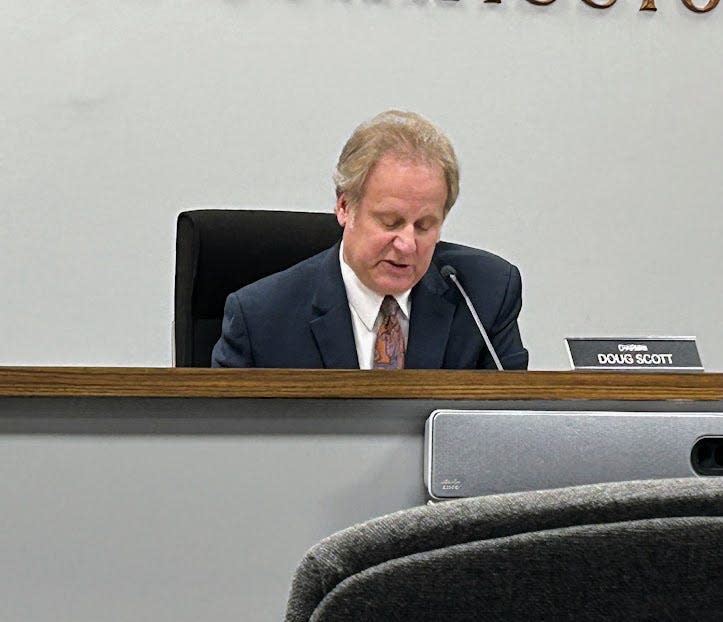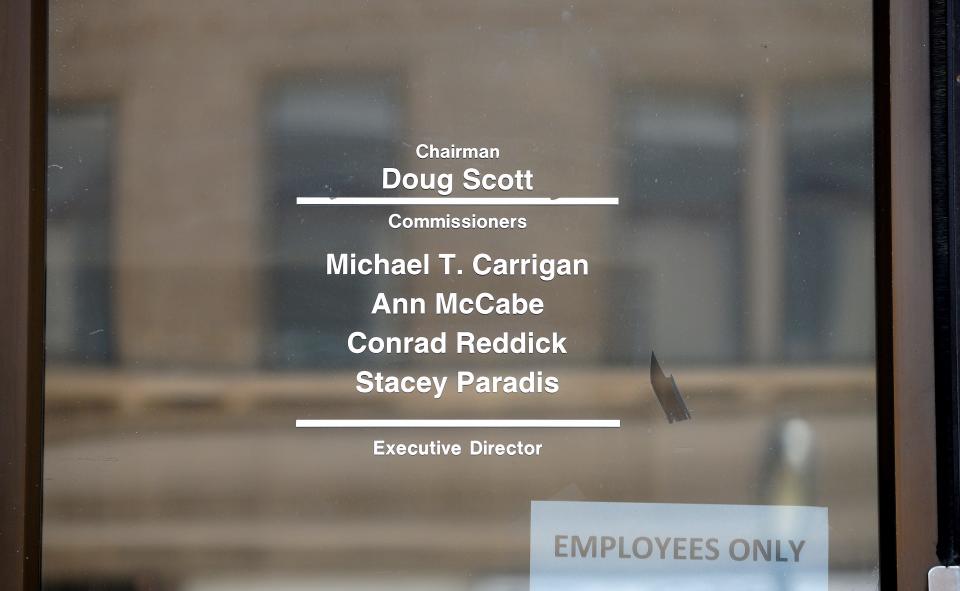CO2 pipelines, utility rate requests await new Illinois Commerce Commission chair
Utility rate increases, carbon dioxide pipelines and implementation of the state's ambitious climate policy initiatives posit themselves on the desk of Illinois Commerce Commission members.
The five-commissioner, quasi-judicial body's new chair leading them in these efforts is a familiar face.
ICC Chair Doug Scott presided over a public meeting in Springfield last Thursday, swiftly working through a four-page docket with a familiarity that comes from experience.
The reason for that familiarity was simple. This isn't Scott's first tour in post. He served in the same role under former Gov. Pat Quinn. Gov. JB Pritzker appointed Scott last month.
Scott replaces Carrie Zalewski, who stepped down earlier this year, and is part of a broader commission shake-up with Pritzker making three other appointments in March.
More: Thousands still without power four days after storms hit Springfield

Scott, a former Rockford mayor and director of the Illinois Environmental Protection Agency who most recently served as vice president for Energy Systems at the Great Plains Institute, will earn an annual salary of $144,038, according to the Illinois Comptroller's office.
One major difference from his first go-around as ICC chair is implementation of the state's keystone climate policy package, policy which he served as a consultant with the governor's office back in 2020. The Climate and Equitable Jobs Act later passed in September 2021 with bipartisan support.
The state is working to have 100% clean energy by 2050 and half of its electricity to come from renewable sources like wind and solar by 2040 through CEJA, which has required the commission to draft several studies to better address its application.
"I'm fully aware of all of the challenges that are part of the CEJA compliance," Scott said. "But, I believe in the goals of the legislation and see it as my responsibility that I do my part to help bring about energy transition in Illinois."
Utility rate increases
CEJA has changed the way utility companies request rate increases, doing away the prior formula-based process and replacing it with one that orders them to submit four-year integrated grid plans with the ICC. Supporters of the policy say it grants the ICC broader jurisdiction in determining what rates will ultimately be.
The old guard, colloquially known as the smart grid bill passed in 2011, permitted utility companies such as Commonwealth Edison to seek increases largely without regulator input. Both Scott and Quinn had opposed the measure before former House Speaker Mike Madigan led a push to override the governor's veto.
Bribery links between Madigan and ComEd — prosecutors alleging the "ComEd Four" gave Madigan allies jobs and contracts to push its favored legislation across the finish line — led to convictions of three ex-lobbyists and its former CEO earlier this year. Under the new format, ComEd requested a $1.5 billion rate increase in January before seeking an additional $247 million in April as reported by Crain's Chicago Business.
Ameren Illinois filed its plan with the commission earlier this year requesting increases for both gas and electric, citing CEJA, COVID-19 and the war in Ukraine as its reasons. All told, the company serving central and southern Illinois is seeking a $160.4 million gas rate hike over one year and a four-year $435.6 million electric increase.
Ameren is joined by four gas utilities and ComEd in requesting ICC's approval to increase their rates this year. According to Capitol News Illinois, electric utilities have asked to raise rates by a combined $2.8 billion over four years, while gas utilities have requested $890 million in increases next year.
Pritzker, meanwhile, has publicly expressed his opposition to a bill granting Ameren the right of first refusal pertaining to future construction of high-voltage electric lines.
Passed in the closing hours of the spring session, Pritzker spokesperson Alex Gough said previously the governor opposes the bill because it “puts corporate profits over consumers.”
ICC's position on rate increase requests and the governor's looming veto will be revealed towards the end of this year when it completes its 11-month review.
![House Speaker Michael Madigan, left, and Illinois Senate President John Cullerton, right, talk prior to Illinois Gov. Pat Quinn's budget address to the Illinois General Assembly at the Illinois State Capitol, Wednesday, March 26, 2014, in Springfield, Ill. [Justin L. Fowler/The State Journal-Register]](https://s.yimg.com/ny/api/res/1.2/HRVTcmYd0BMoj5s2_YKYzA--/YXBwaWQ9aGlnaGxhbmRlcjt3PTk2MDtoPTY4NQ--/https://media.zenfs.com/en/the-state-journal-register/a617897f1fa19fd5c8eda6b23c3c1013)
More: Protests mounting over proposed CO2 pipelines cutting across Peoria, Tazewell counties
CO2 pipeline applications
With federal investment on the rise, Scott and the ICC will likely see more requests to build carbon dioxide pipelines in Illinois.
Less than a week before Pritzker announced Scott's nomination, Wolf Carbon Solutions U.S. filed an application for a $1 billion carbon dioxide pipeline that would run in neighboring Logan and Macon Counties. Traveling southeast from the Quad Cities, 166 miles of pipeline will cross Illinois and transport up to 12 million metric tons of CO2 collected from two ethanol producing Archer-Daniels-Midland plants in Iowa. That CO2 would be stored in ADM's facility just outside of Decatur.
That application follows up with a pipeline running through Sangamon County and 292 miles in the state, drawing many central Illinois government agencies to issue CO2 pipeline construction moratoriums over safety concerns.
Providing testimony last month, ICC senior gas engineer Mark Maple recommended the commission to turn down Navigator Heartland Greenway LLC's request. Maple's reasons for his opposition were multi-fold for the $3.2 billion pipeline stretching 1,350 miles across five midwestern states.
For starters, testimony finds the Nebraska-based company has not received sufficient amounts of easements, granting the use of land for the pipeline, nor does it have experience in building CO2-specific pipelines. Yet, perhaps most essential to the operation, is the need for a place to store the liquified CO2 which Navigator is currently lacking.
Attempts to build sequestration sites in Christian and Montgomery counties are ongoing, where both counties have adopted moratoriums blocking the construction of CO2 pipelines.
"Without a sequestration facility in place and the end point being uncertain, the entire route remains in flux, andconsequently, in my opinion, it is not a benefit to the citizens of Illinois nor in the public interest," Maple's testimony reads.
Navigator has only received 13.4% of the easement agreements needed to build which "is an extraordinarily low success rate given the time that has elapsed," he added.
Maple also contends the state's Carbon Dioxide Transportation and Sequestration Act, legislation passed in 2011 promoting the use of the pipelines as a public good, was intended for the "promotion and use of Illinois coal."
Navigator's pipeline would instead be collecting and transporting CO2 emissions from more than 20 ethanol plants mostly outside of the state, which he felt does not meet the legislative intent.
Responding to the testimony, Navigator told The State Journal-Register that it disagreed with the analysis.
"The State of Illinois has made an active commitment to leading the way on clean energy development, and carbon capture is a critical piece of that pathway for today, tomorrow, and years to come," Navigator said in an emailed statement. "The legislature clearly contemplated that carbon management would have a variety of industry applications, by including language in the law that identified necessary partner facilities as 'any other source that will result in the reduction of carbon dioxide emissions from that source.'"
The company also states the status of established sequestration facilities as indicated by the testimony was a "misrepresentation," saying they have both the necessary land rights and multiple Class VI permit applications filed with and approved by the US EPA.
Navigator will be in town on July 17 for a public meeting held at the Bank of Springfield Center where it and pipeline opponents are expected to give presentations.

Andrew Adams of Capitol News Illinois contributed to this report.
Contact Patrick Keck: 312-549-9340, pkeck@gannett.com, twitter.com/@pkeckreporter.
This article originally appeared on State Journal-Register: New ICC chair to take-on CO2 pipeline, utility rate increase requests

